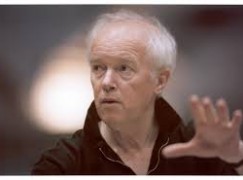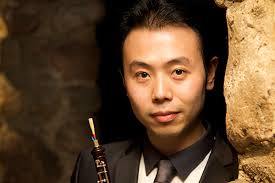Dutch joke: Edo de Waart is awarded assistant conductorship
OrchestrasPress release:
The Netherlands Radio Philharmonic Orchestra has awarded honorary conductor Edo de Waart with the title Assistant Conductor. The Edo de Waart Assistant Conductorship was presented today in honour of De Waart’s 80th birthday.
They couldn’t find a better title?
UPDATE: His London agency has issued this clarification:
Yesterday Edo was rehearsing with the Netherlands Radio where he was previously Music Director and is now Conductor Laureate – at the rehearsal they announced that for his 80th birthday, which they are celebrating this week, they have dedicated the assistant conductor position to him and the title now bears his name. A kind gesture reflecting the longstanding relationship he has with the orchestra.
He’s delighted to finally be back on the podium in Amsterdam this week as part of a year of sadly curtailed concert celebrations for his 80th year – his birthday is in June.






He still has room to move up.
Bernard Haitink became second conductor of the orchestra in 1955.
I don’t know whether Haitink is still patron of the RFO but he may like the idea of being Conductor Emeritus with Edo as his assistant.
Titles are not everything, but I take your point – this does not seem appropriate for a conductor of his quality, stature and experience.
I would like to find on Youtube a video with him when he was a oboe player of the RCO.
I would like to correct your first line. The assistant conductorship is not awarded but dedicated to maestro De Waart and named after him. You could argue if this is appropriate of course.
You are right, Marco.
And I’d just like to add here that Edo de Waart was a wonderful, imaginative, and moreover, very significant music director at the San Francisco Symphony, my hometown orchestra.
He shepherded the orchestra through its split into the SFS and the SF Opera Orchestra. Before Edo’s time, both orchestras employed essentially the same players, and the opera season and the symphony season had to be coordinated so they did not clash. Perforce, additional players had to be engaged for both the SFS and the SFOO.
He was also the music director as the SFS moved from performing at the War Memorial Opera House (which it had done ever since the Opera House opened in 1932) to its new home, Davies Symphony Hall, in 1980.
I have nothing but praise and many bravos for Edo De Waart!!!!
Beautiful comment Greg. And let’s not forget that maestro De Waart is one of the few top conductors who never forgets where he came from. He worked hard for everything he did. So my humble opinion is that he even might be proud that the assistant-conductorship (hard work, much learning, little spotlight) is named after him.
Better late than never.
I think you have misunderstood. The orchestra is calling its assistent-conductorship the ‘Edo de Waart assistant conductorship’. De Waart himself has got nothing to do with the actual post of assistant conductor himself.
But it’s still a second-class title dedicated to a first-class conductor.
It is like “The XYZ Chair of ….”
One has to understand the typical Dutch mentality in relation to individual achievement to be able to get to grisps with such an absurd gesture. Namely, within the borders of the Low Countries this is puffickly normal. It happens all the time.
Holland was an artificial country, wrestled by rebellion from the large empire of Charles V and later his son, Philip II. This was a powerful autocratic Middle-European empire with large territories elsewhere, including South America and the Far East (The Filippines were named after Philip II). Holland was the first European bourgeois society with relative freedoms unknown elsewhere. The dominant religion was Calvinist, although this was not the official state religion, and other religions were accepted, albeit with some restrictions for the catholics. These two influences: a dangerous big empire threat out-there, and a religion which hammered it in that you should not imagine being better than someone else, created a collective consensus that only collective action and achievement was OK. In other words: individual achievement was either a dangerous threat (‘autocratic, elitist, arrogant’), or unfair (‘self-aggrandizement’). This created a mental climate where mediocrity and group think is fair for everybody and widely encouraged, where the poor and the damaged are helped (social urges), but where individual talents or achievements are suspicious and pulled-down from their (imagined, unfair) pedestal. So, that is why talented and high-achieving artists have to make their career abroad (basically, they are chased out of the country) and are treated badly when they set a foot in the homeland again. I could give a long list of absurdist gestures of hostility but why criticizing a small-minded, petty-bourgeois nation that prizes itself highly on freedom and social awareness? And on an entirely successful multicultural society, where the many violations of the rules don’t invite for mentality change? And which is such a happy haven for tax evasion and drug dealers?
I know from personal accounts of conductors and performers that when they make the mistake to settle and work in Holland, after a while they find-out what its reality is, and they flee over the borders. For visiting artists however, the story is very different, because they are not ‘from our group’ and will depart anyway.
De Waart is a great conductor who made a name for himself outside the Low Countries, so: give him a humiliating title so that he doesn’t get it into his head that he is more than we are, in our nice little village.
John , your sentiment sounds very Irish to me.
Nul n’est prophete’ etc…
Indeed….
But it may be that Norman misunderstood what really happened – which means the case is less serious, but what I said about the Low Countries remains equally true of course.
It also sounds like the attitude of many US mid-westerners, particularly of Germanic and Scandinavian origin in places like Minnesota and Wisconsin.
Tom, Edo de Waart now lives near Madison, Wisconsin and was the conductor of the Milwaukee Symphony Orchestra. And a damned good one, too.
As an Englishman who once worked as artistic director of a Dutch orchestra, I would like to support John Borstlap’s very perceptive societal analysis. It is neatly borne out by the fact that Dutch orchestral musicians are almost unanimously averse to using the term “Maestro.” In his native country, the eminent and gifted conductor in question would routinely be spoken of and addressed as “Mr. de Waart.”
[One has to understand the typical Dutch mentality in relation to individual achievement to be able to get to grisps with such an absurd gesture.]
Given your demonstrated expertise in Hinduism, I can only assume you know what you’re talking about.
Chairs/positions are named after the donor who gave at the appropriate level, so unless Edo de Waart gave a barrow full of money to the orchestra, I’d say he got a great deal, especially if he gave nothing.
(You know, Muti isn’t called the “Solti Music Director”, but the “Zell Family Foundation Music Director” at Chicago.)
Something lost in translation, I suspect, though the Dutch are probably the best English speakers (and I include us Americans).
de Waart was, I believe, the lead oboe of the Netherlands Wind Ensemble at one time.
This is surprising keeping in mind the blatant age discrimination found in these positions, that usually carry an age limit of 30 or 35 years (illegal according to EU law).